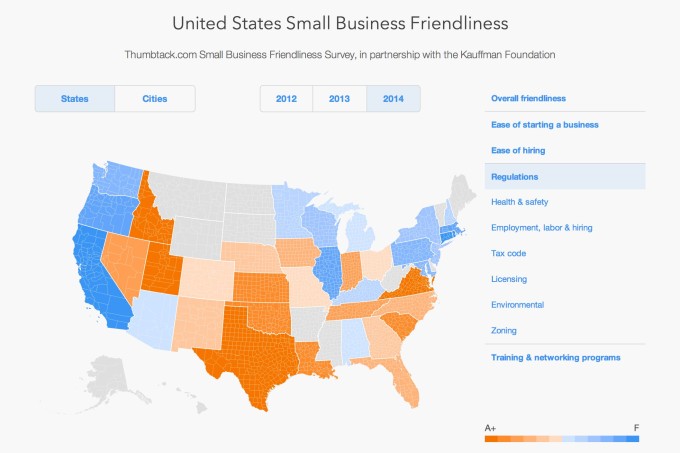Want to start your own business but not sure where it belongs? A recent survey can help you decide. Online marketplace Thumbtack, in partnership with the Ewing Marion Kauffman Foundation recently released the findings of its third annual Small Business Friendliness Survey.
The survey collected data from more than 12,000 small businesses in 38 states and 82 metropolitan areas. Criteria included overall friendliness, ease of starting a business, ease of hiring, regulations (health & safety, employment, labor & hiring, tax code, licensing, environmental, and zoning), and training & networking programs.
Think New York and California fared the best? Nope! Utah, Idaho, and Texas were rated highest for small business friendliness. Cities with the highest ratings were Boise, Houston, and Colorado Springs. Despite being a startup hotbed (and home to Thumbtack), California received an “F” grade, along with Rhode Island and Illinois.
“Creating a business climate that is welcoming to small, dynamic businesses is more important than ever, but rarely does anyone ask small business owners themselves about what makes for a pro-entrepreneur environment,” said Jon Lieber, Chief Economist of Thumbtack. “Thousands of small business owners across the country told us that the keys to a pro-growth environment are ease of compliance with tax and regulatory systems and helpful training programs.”
This marks the third-consecutive year California has received the lowest possible grade in terms of state regulatory burdens. The Golden State’s small business owners expressed the greatest concern with California’s environmental, health, and labor regulations.
Kentucky saw the most improvement from last year’s report, jumping from a “B-“ to an “A.” Other states have shown consistency the past few years: Small businesses in Texas, Utah and Idaho have been in the top five every year this survey has been released, while California and Rhode Island have ranked in the bottom five every year.
“It is critical to the economic health of every city and state to create an entrepreneur-friendly environment,” said Dane Stangler, vice president of research and policy at the Kauffman Foundation
“Policymakers put themselves in the best position to encourage sustainable growth and long-term prosperity by listening to the voices of small business owners themselves.”
Do you think entrepreneurs will consider these grades when starting their business? I think it serves as a good indicator of what city and state officials can do to better welcome and support small businesses. For those who received a failing grade, just like in school, there’s no excuse not to pass this test. But, people will choose to live where they want to live, despite the survey’s findings .
